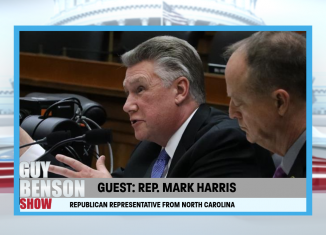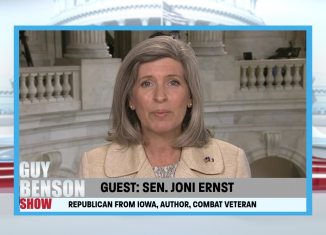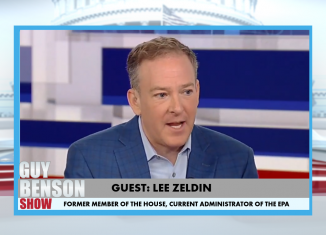Senator Bill Cassidy (R-LA) On Federal Response To Coronavirus
The American Red Cross put out a call for blood donations, the Kentucky Derby was delayed to September, and Ohioans were not going to the polls Tuesday as the coronavirus once again dominated the global landscape. President Donald Trump, speaking at the White House, promised to help thousands of workers facing furloughs and layoffs. Among options being considered: $1,000 checks to almost all adult Americans, he said. Trump urged everyone to remain vigilant – stay at home as much as possible, limit gatherings to 10 people – for at least two more weeks.
Guy got reaction from Senator Bill Cassidy, M.D. United States Senator For Louisiana.
Listen Below:
Full Transcript:
Guy Benson: From Washington, D.C., it is the Guy Benson Show our final hour of the program brought to you by the finished long drink, the long drink dot com. Thanks for being here. Our Web site is Guy Bensen show dot.com podcast available there for free. You can subscribe every day, subscribe once and then listen every day. We’re hearing from a lot of people now who are self-quarantine self isolated, who are listening to a lot of podcasts and radio. So maybe make this show part of your Daily Digest. We’d be honored to have you. Thank you for listening right now. And joining me right now is U.S. Senator Bill CASSIDY, who’s a medical doctor. He represents the state of Louisiana. Doctor. Senator, good to have you.
Sen. Cassidy: Hey, guy, I’m glad to be with you, man.
Guy Benson: I want to ask you this question, big picture, because part of your legacy as a public servant and a doctor was really helping a lot of people who didn’t have many resources, who needed help desperately in the aftermath of Hurricane Katrina. That was obviously a very difficult and unique circumstance that presented difficult challenges. If you can just talk about maybe contrasting some of those challenges versus what the health care community faces today with coronavirus.
Sen. Cassidy: So I think in both cases it was more than health care. It was it was both the economy, individual lives and, you know, how does a business keep going and keep people employed? There are similar situations. Big difference. Now, when I see people clear out grocery shelves, there is no reason to now. There are not there are not trees that are blown down across an interstate. People can still get things in and out. So there will be goods in the store over the next week and the next two and three and four and five weeks. That’s the same one thing. That is this one that’s different. One thing that is also the same, though, is that you have small businesses wondering how they can keep people employed, knowing they will need that trained set of employees once they get back on their feet. One thing we’re working on right now in Congress is how do we give dollars to that employers so that she or he he doesn’t have to lay people off and is held harmless as to the financial obligation. Secondly, we also know that businesses, if you will, who have business interruption, have mortgages that they have to pay, capital expenses, other loans. How do we also help them with their loans? We’re creating that possibility. We did the same thing after Katrina. We’re doing the same thing now. We need a vibrant economy when we emerge from this one. Health care. Health care is very similar in the sense of the system has the potential to be overloaded. The system is not overloaded now. But if you look at the rate that the virus spreads, then somewhere around maybe April, May, we’re going to have so many patients that ICU beds will all be full ventilators occupied. Folks turned away because there is no room in the hospital that happened after Katrina. That’s what that’s the very similar situation. That’s where we need to flatten the curve and get and make sure everybody is doing their best not to spread the virus.
Guy Benson: Are there ways to get out in front of those problems? Because we saw at the press conference earlier today, it seems like the Army Corps of Engineers and others are really getting to work on expanding capacity, figuring out hospital beds. There are questions about ventilators. There was a specific request from the vise president for construction companies to donate their their masks and to stop ordering additional masks so there’s not a backlog. What are some of the things that the health care industry, hospitals, doctors, other care providers can be doing proactively to stem some of that tide? In addition to the flattening of the curve where we’re all sort of responsible, what can the health sector do in anticipation of potential overcrowding in the next month or two months?
Sen. Cassidy: Everything about stopping potential overcrowding depends upon flattening the curve. Period. End of story. So the person who thinks that she might be infected stays home for two weeks instead of going out and infecting six other people has done more to save lives than anything else we could do. Now, that said, yes, there’s coordination. Veterans Administration hospitals, for example, may be involved in this. Department of Defense assets are being mobilized. Hospitals are buying more ventilators. They’re reopening wings of their hospitals that have not been used. But there’s only so much we can do with that. And if that peak occurs of patients, as has happened in northern Italy right now, where it overwhelms the system, then you’re making decisions as to who to put in the ICU and who not to based upon viability. And so I think I know that in Italy now, if you’re over 80, you don’t go to the ICU. You stop and unfortunately go to a hospital bed and you die and you just start moving down that age depending upon how how many patients you have waiting to be admitted,.
Guy Benson: Which is frightening. That’s a very scary human catastrophe. That’s, you know, this in their mind necessary triaged. But that’s literally what is happening right now in Italy. I do have a question for you, Doctor. I’m not sure if you have a good answer yet. And I don’t know if anyone has a good answer yet. But it seems to me that one of the important questions about coronavirus is once people recover from it and we know that the recovery rate is 99 percent, it’s even higher for young people. Once people. Get coronavirus live through it with mild or no symptoms in many cases and in other cases significant symptoms when they come out the other side and they are recovered. Are they then immune from getting it again in the future, because I’ve been reading a lot about people saying it could come back in the fall. Could people potentially get it again? That seems like highly relevant to the trajectory that we’re on.
Sen. Cassidy: So it’s a little bit what we don’t know yet. Let me go back to the flu, which is an obvious example. Every year the flu modifies just enough. So you’ve been previously exposed and you have lots of antibodies that help fight it off. They’re not quite precise, but but they’re but they’re able to kind of mitigate to decrease the harm by the slightly different version of the flu virus. So so if so, but that’s because over a year the flu virus mutates just enough that it’s just a little bit different, that, yes, we’re protective, but we’re not quite as protected as if we get the latest vaccine. Well, we don’t know what the Corona virus is. Will it mutate enough so that it presents a different picture to our immune system? Most likely, those previously exposed will have some protection against that somewhat mutated corona virus. But we have to figure that out. More importantly, it does seem as if the other corona viruses, maybe not this one, but probably this one, it tends to go down in hot, humid weather. So think August in New Orleans, we’re going to move the nation’s capital to New Orleans. Okay. So if you go to New Orleans in August, a little sticky, but the Corona virus in general does not do well in that environment. But then when the weather cools off, it starts coming back. Those people who were not exposed this year might be exposed next fall and winter. That’s why we’re working so rapidly on a vaccine, because we need to have a vaccine to protect us when it comes back next fall and winter.
Guy Benson: Now, I would say it gets pretty hot and humid here in D.C. as well as why they call it the swamp. Last question. It has to do with a serious issue before the U.S. Senate, which is this relief package that’s being discussed. I know that the White House was a little short on details today. They’re going to roll that out sometime soon. But the president said we’re going big. We’ve heard some reporting $850 billion dollars in terms of relief. Do you feel confident that we know? What the contours of that bill would look like and the people who actually need the help the most would get it as opposed to just a giant blanket approach. Senator.
Sen. Cassidy: So anytime you’re trying to do something quickly, it will not be as precise as you want it to be. But there is going to be assistance to small businesses with the hope that they will keep people employed. I mentioned Hurricane Katrina. The recovery is dependent upon small businesses staying afloat and having their trained employees there so that when they restart, they have everybody they need to restart. So they’ll be focus upon that. I’m hearing that there will be direct checks cut to families below a certain income level because we know a family that’s lower income, less likely to have money in the bank, but they still have a mortgage. They do have a car note to out to buy groceries, but they are more susceptible to being laid off, et cetera. So there’s that group of folks that there’s going to be some direct payments, there’s going to be a deferral of tax payments required. So if you’re an individual or a business, what I’m hearing is that on April 15th, you can file an extension or you can be delayed. There won’t be penalties. They will still want people to file because if you file, they get it. You may get you may get a refund. Right. So. So you still want that. So there’ll be the refunds given, but a delay in having to send things to the federal government. So just trying to make sure that people have the dollars for cash flow for the person, their family and for their business.
Guy Benson: Well, medical Dr. Bill CASSIDY is also a U.S. senator, so he’s an ideal guest on this program on a day like this, expertise in the medical field and then inside information on what’s happening on Capitol Hill. Highly relevant to the American people on both fronts. Dr. and Senator Bill CASSIDY. Thank you very much for your time today. Thank you. We’ll take a break and be right back on the Guy Benson Show.







